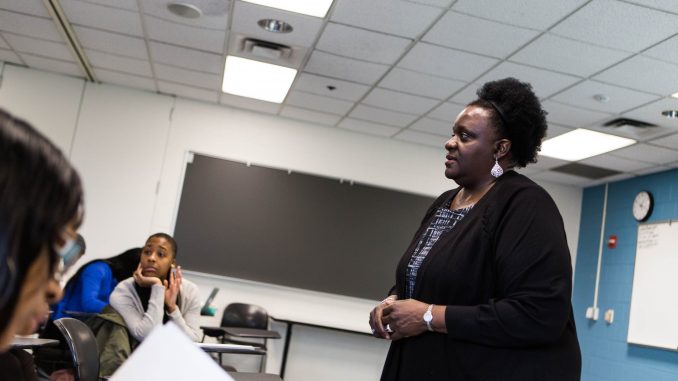
Growing up in Point Breeze, Carolyn Parks said she was the only one of her siblings able to help her grandfather, who was diabetic and had to have his legs amputated.
“I just had an affinity for helping people and wasn’t queasy about open wounds, blood, all of that,” Parks said. “None of the other siblings could stomach any of that.”
This early experience, coupled with taking care of people and animals throughout her childhood, made Parks want to work closely with communities in her career, she said.
“I always had this vision of myself working in the community teaching classes, teaching people how to be healthy,” she added.
Parks recently returned to Philadelphia for the first time since she left in 1987 to become a social and behavioral sciences professor in the College of Public Health. She came home in August, the same month she originally moved 30 years ago.
Prior to her appointment, she taught for more than 20 years at several different colleges and worked with the Centers for Disease Control and Prevention for a decade. Parks teaches Community-Based Health Program Planning I, the first part of a two-semester capstone course that examines public health education programs and interventions. Students in the course also write a grant proposal for a fictitious foundation.
During her career, Parks has worked with many community health organizations and churches — like the Washington, D.C.-based American Public Health Association and the New Testament Church of Christ in West Philadelphia.
Because college classes at the time did not target public health, Parks decided to pursue medicine instead, earning her bachelor’s in biology from Wheaton College in 1981.
“It was way back then in the ’70s,” she added. “The only thing we thought we could be, if we were interested in health care, was a nurse or a doctor.”
Parks got her first job in the public health field after earning her master’s of health education at Western Illinois University in 1984. She worked as a program coordinator at the Health Promotion Council of Southeastern Pennsylvania, an organization founded in 1981 to develop community-based education programs for controlling high blood pressure.
“It was actually one of the best jobs I ever had because I really got to use my skills I had learned in my master’s program,” Parks said.
Tasked with developing health education programs for African-American communities, Parks created workshops, health fairs and classes to train attendees on how to take their blood pressure. She said she also created one of the first public health education brochures specifically addressing African-Americans. Many local health departments began to use it.
According to the National Center for Health Statistics, about 57 percent of African-American women were obese between 2011 and 2014. During the same timeframe, about 45 percent of African-American women had hypertension.
When she taught at the University of North Carolina at Chapel Hill in the 1990s, Parks researched on the myth of the “strong Black woman,” or the idea that Black women can always remain strong and healthy in the face of racial oppression.
“Black women are supposed to be strong…pillars of our community, the backbones of our families,” Parks said. “Somehow both the vision and the assignment of this entity of strength does not mesh with the health statistics.”
Parks and her former husband moved to Springfield, Massachusetts, in 2006. After spending only six months there, she earned a two-year postdoctoral fellowship with the CDC.
When the fellowship ended, Parks was offered a full-time position and stayed with the CDC for 10 years.
Parks worked with a branch of the CDC that develops HIV-prevention strategies for specific populations. She focused on African-American women.
According to the CDC, African-American women made up 60 percent of all women in the United States diagnosed with HIV at the end of 2014.
Parks worked with a group of people to translate research into several HIV education programs developed by the CDC, including WILLOW, an educational intervention for women living with HIV. She also helped develop Sister to Sister and Healthy Love, which are HIV-prevention programs for African-American women.
She revised the materials used for each program and trained program facilitators.
While studying at Western Illinois University, Parks said her academic adviser and now mentor, James Neutens, accepted a program director position at the University of Tennessee at Knoxville, and encouraged her to attend the university to earn her Ph.D. in education, which she completed in 1993.
Neutens said he views Parks’ HIV research at the CDC as an extension of her earlier work with community-based health organizations.
“When she did her master’s degree, it was interesting to me because she really was reaching out to people and churches,” Neutens said. “So when she got to the CDC, it was the very same thing, reaching out to [people with HIV] who needed help.”
“She’s really a giving person and really as concerned about humanity overall,” he added.
Now at Temple, Parks said she wants to support Philadelphia’s many community health programs. She said she’s noticed issues like asthma in children and lead exposure primarily affecting African-Americans in the city.
“At this point in my career, I can be a great support,” she added.


Be the first to comment